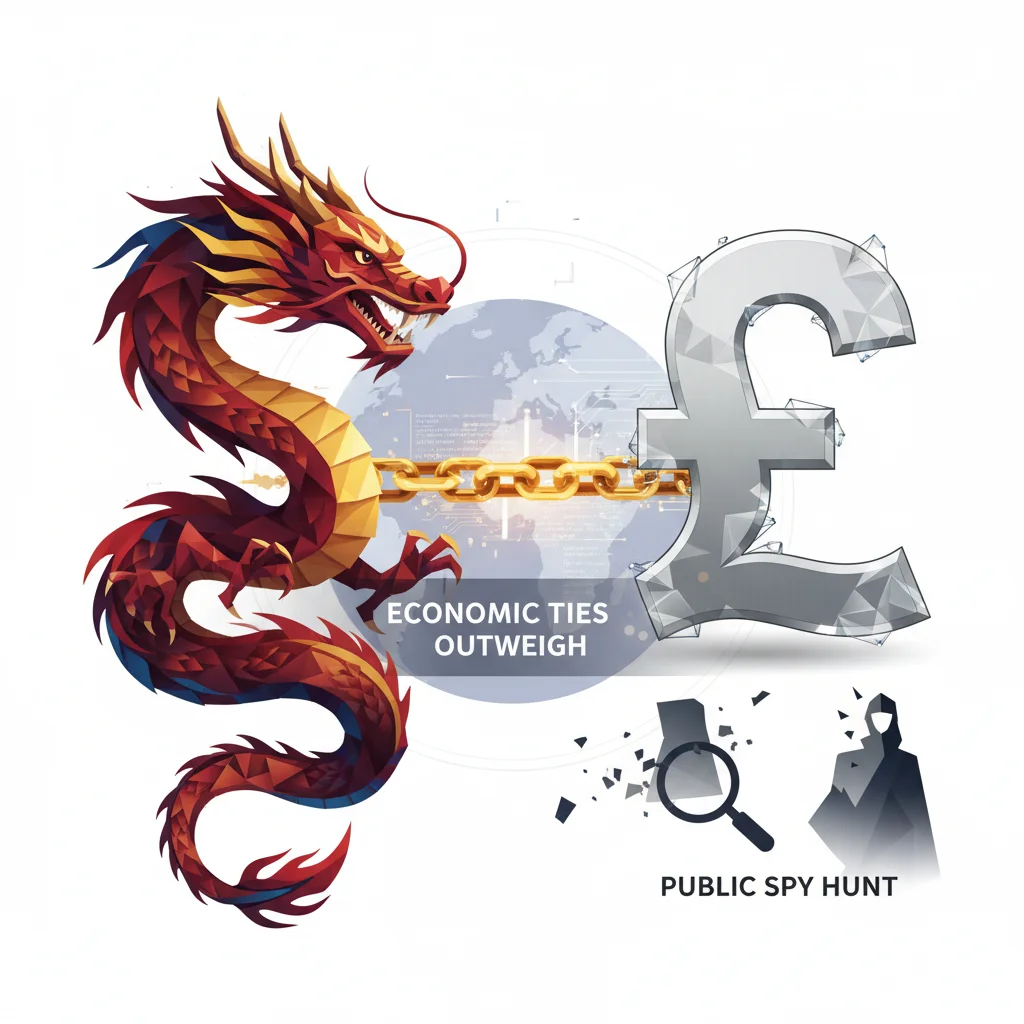
The Dragon and the Pound: Why UK’s Economic Ties with China Outweigh a Public Spy Hunt
In the high-stakes world of international relations, headlines are often dominated by espionage, political posturing, and security threats. The recent arrest of a parliamentary researcher on suspicion of spying for China has once again thrown the UK’s relationship with the global superpower into the spotlight, igniting a fiery debate about national security versus economic prosperity. Amid calls for a tougher stance, one veteran voice of British politics, former Business Secretary Sir Vince Cable, has offered a different, more pragmatic perspective. In a recent letter to the Financial Times, he argues that while the threat is real, the UK is right to prioritize its deep-seated trade relationship over a public “hunt for Chinese spies.”
This viewpoint cuts through the political noise, forcing us to confront a complex reality: in a deeply interconnected global economy, how does a nation like the UK manage a relationship with a country that is simultaneously a vital economic partner and a “systemic competitor”? For those in finance, investing, and business, this isn’t just a political question—it’s a fundamental issue that impacts market stability, supply chains, and long-term economic strategy.
This article delves into the delicate balancing act facing the UK, exploring the immense economic stakes, the undeniable security risks, and the strategic calculus that suggests pragmatism, not political theatre, is the wisest course of action for navigating the future of the global economy.
The Economic Lifeline: Quantifying the UK-China Relationship
To understand the rationale behind prioritizing trade, one must first grasp the sheer scale of the economic interdependence between the UK and China. This is not a peripheral trading relationship; it is a cornerstone of the modern UK economy. For decades, successive governments have worked to foster these ties, recognizing China as a critical source of investment, a vast market for British goods and services, and an integral part of global supply chains that keep prices down for UK consumers.
According to the latest data from the UK’s Department for Business and Trade, the numbers speak for themselves. In 2022, China was the UK’s fourth-largest trading partner, accounting for 6.3% of the UK’s total trade. The total trade in goods and services between the two nations was an estimated £107.5 billion.
Let’s break down the key components of this vital economic partnership:
| Trade & Investment Area | Key Details & Impact on UK Economy |
|---|---|
| Imports from China | The UK imported £68.9 billion in goods and services from China in 2022. This includes everything from electronics and machinery to textiles, keeping consumer prices competitive and supplying essential components for UK manufacturing. |
| Exports to China | The UK exported £38.6 billion to China. Key sectors include automotive (e.g., Jaguar Land Rover), pharmaceuticals, and high-end manufacturing. The City of London’s financial and professional services are also a major export. |
| Foreign Direct Investment (FDI) | Chinese investment flows into critical UK sectors, including infrastructure (e.g., nuclear power), real estate, and technology. This capital is vital for job creation and long-term economic projects. |
| Education & Tourism | Chinese students represent the largest international student body in the UK, contributing billions to the higher education sector and local economies. Chinese tourism is also a significant source of revenue. |
Severing or significantly damaging these ties would send shockwaves through the UK stock market and broader economy. It would mean higher inflation, disrupted supply chains for countless British businesses, and the loss of a crucial market for UK exporters. For investors, this geopolitical volatility translates directly into portfolio risk, making the government’s approach a key factor in financial forecasting and economic analysis.
Beyond the Dip: Why an XRP ETF Could Be the Next Big Catalyst in Digital Finance
Confronting the Security Dilemma
Of course, this economic argument does not exist in a vacuum. The security concerns are legitimate and well-documented. Western intelligence agencies have consistently warned of China’s efforts to acquire sensitive technology, conduct cyber-espionage, and exert political influence. As Sir Vince Cable notes, the “industrial-scale theft of intellectual property” and attempts to “nobble academics and politicians” are not to be dismissed.
The challenge for the security services is immense. The threat is not just from traditional spies but is deeply embedded in the economic relationship itself. It can manifest through:
- Cyber Attacks: State-sponsored actors targeting critical infrastructure, including the banking and financial technology (fintech) sectors.
- Intellectual Property Theft: Companies engaged in joint ventures or operating in China risk having their proprietary technology stolen, undermining their competitive advantage.
- Dual-Use Technology: Chinese investment in UK tech start-ups, particularly in areas like AI and quantum computing, raises concerns that civilian technology could be diverted for military purposes.
The critical point Cable makes is not that these threats should be ignored, but that the response must be proportional and effective. He suggests that public “spy-hunting” scandals often achieve little beyond diplomatic fallout, while the real work of counter-espionage happens quietly and professionally behind the scenes. A performative, hawkish stance could jeopardize the very economic stability that underpins the UK’s national strength, potentially causing more harm than the threats it purports to combat.
Sir Vince Cable’s position can be easily misconstrued as being “soft on China.” However, a deeper analysis suggests it’s a reflection of strategic realism in a multipolar world. The unvarnished truth is that a full economic decoupling from China is a fantasy—one that would likely trigger a severe recession in the UK and across the West. The supply chains are too integrated, the financial ties too deep, and the Chinese market too large to simply walk away from.
The real strategic challenge, therefore, isn’t if the UK should engage with China, but how. This is where the focus must shift from public confrontation to building strategic resilience. This involves a multi-pronged approach: diversifying supply chains away from single-source dependency (a process known as “de-risking,” not decoupling), investing heavily in domestic cybersecurity for critical sectors like banking and fintech, and implementing far more rigorous screening of foreign investment in sensitive industries. The quiet, methodical work of MI5 and GCHQ is infinitely more valuable than a politician’s fiery speech. This “difficult dance”—engaging economically while defending robustly—is not a sign of weakness; it is the signature of a mature economic power navigating the complex realities of 21st-century economics and geopolitics.
From “Golden Era” to “Systemic Competitor”: Navigating Policy Whiplash
The current tension is a far cry from the “golden era” of UK-China relations championed by the Cameron-Osborne government less than a decade ago. That period was defined by a full-throated embrace of Chinese investment and trade, with London positioning itself as the premier Western hub for renminbi trading and Chinese finance. The policy shift has been stark. The UK’s 2023 Integrated Review Refresh now labels China as an “epoch-defining and systemic challenge.”
This policy whiplash creates profound uncertainty for business leaders and finance professionals. Long-term investment decisions, particularly in infrastructure and technology, require a stable and predictable policy environment. When the political winds can shift so dramatically, it raises the risk profile for any UK-based company with significant exposure to China, impacting everything from stock valuations to corporate trading strategies.
The challenge for the UK government is to craft a coherent, long-term strategy that transcends partisan politics. Such a strategy must clearly define which sectors are off-limits to Chinese investment for national security reasons while simultaneously providing reassurance and support for non-sensitive commercial and economic engagement. Without this clarity, the UK risks falling between two stools: failing to adequately protect its security while also deterring the beneficial investment and trade that its economy needs to thrive.
Japan's Demographic Dilemma: Why More Stimulus Won't Fix a Shrinking Economy
The Investor’s Playbook in an Age of Geopolitical Risk
So, what does this complex geopolitical landscape mean for the average investor or business leader? It means that geopolitical risk analysis is no longer a niche concern but a core component of any sound financial strategy.
Here are some key considerations for navigating these headwinds:
- Diversification is Paramount: Over-reliance on any single country, whether for supply chains or as a customer base, is a significant vulnerability. Businesses and investors should actively seek to diversify their operations and portfolios across different geographic regions to mitigate this risk.
- Sector-Specific Scrutiny: Investors must analyze how different sectors are affected. Technology, telecommunications, and defence are on the front line of security concerns and face heavy regulatory scrutiny. In contrast, consumer goods or financial services may have a different risk profile.
- Understand the Regulatory Landscape: Stay abreast of policy changes, such as the National Security and Investment Act in the UK, which gives the government powers to scrutinize and block deals on security grounds. This has direct implications for mergers, acquisitions, and foreign investment.
- The Rise of Trade-Tech: In this new environment, financial technology will play a crucial role. Innovations in fintech and even blockchain could offer more secure and transparent ways to manage international trading and supply chain finance, reducing some of the risks associated with geopolitical friction.
Conclusion: A Delicate Balance for a Prosperous Future
The debate over the UK’s China policy is a microcosm of the central challenge facing Western economies today. The era of globalization, once seen as an unstoppable force for integration, has given way to a more fragmented and competitive world. In this new reality, nations must perform a delicate balancing act between economic necessity and national security.
Sir Vince Cable’s argument is a powerful reminder that in this arena, pragmatism must triumph over posturing. Protecting the UK from genuine threats is non-negotiable, but this must be achieved through sophisticated intelligence and targeted security measures, not by sacrificing a trade relationship that supports millions of jobs and underpins the UK’s economic health. For the worlds of finance, banking, and investment, a stable, predictable, and realistic approach to China is not just desirable—it is essential for long-term prosperity and stability in an increasingly uncertain world.


